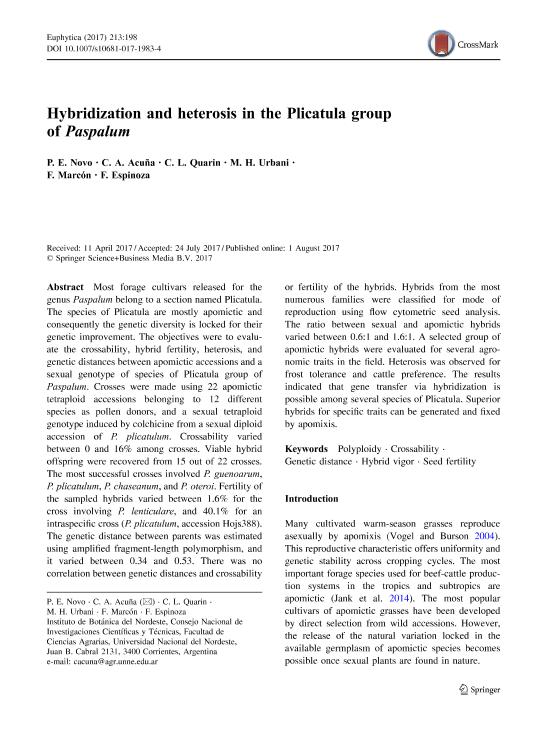Artículo
Hybridization and heterosis in the Plicatula group of Paspalum
Novo, Patricia Elda ; Acuña, Carlos Alberto
; Acuña, Carlos Alberto ; Quarin, Camilo Luis
; Quarin, Camilo Luis ; Urbani, Mario Hugo; Marcón, Florencia
; Urbani, Mario Hugo; Marcón, Florencia ; Espinoza, Francisco
; Espinoza, Francisco
 ; Acuña, Carlos Alberto
; Acuña, Carlos Alberto ; Quarin, Camilo Luis
; Quarin, Camilo Luis ; Urbani, Mario Hugo; Marcón, Florencia
; Urbani, Mario Hugo; Marcón, Florencia ; Espinoza, Francisco
; Espinoza, Francisco
Fecha de publicación:
08/2017
Editorial:
Springer
Revista:
Euphytica
ISSN:
0014-2336
Idioma:
Inglés
Tipo de recurso:
Artículo publicado
Clasificación temática:
Resumen
Most forage cultivars released for the genus Paspalum belong to a section named Plicatula. The species of Plicatula are mostly apomictic and consequently the genetic diversity is locked for their genetic improvement. The objectives were to evaluate the crossability, hybrid fertility, heterosis, and genetic distances between apomictic accessions and a sexual genotype of species of Plicatula group of Paspalum. Crosses were made using 22 apomictic tetraploid accessions belonging to 12 different species as pollen donors, and a sexual tetraploid genotype induced by colchicine from a sexual diploid accession of P. plicatulum. Crossability varied between 0 and 16% among crosses. Viable hybrid offspring were recovered from 15 out of 22 crosses. The most successful crosses involved P. guenoarum, P. plicatulum, P. chaseanum, and P. oteroi. Fertility of the sampled hybrids varied between 1.6% for the cross involving P. lenticulare, and 40.1% for an intraspecific cross (P. plicatulum, accession Hojs388). The genetic distance between parents was estimated using amplified fragment-length polymorphism, and it varied between 0.34 and 0.53. There was no correlation between genetic distances and crossability or fertility of the hybrids. Hybrids from the most numerous families were classified for mode of reproduction using flow cytometric seed analysis. The ratio between sexual and apomictic hybrids varied between 0.6:1 and 1.6:1. A selected group of apomictic hybrids were evaluated for several agronomic traits in the field. Heterosis was observed for frost tolerance and cattle preference. The results indicated that gene transfer via hybridization is possible among several species of Plicatula. Superior hybrids for specific traits can be generated and fixed by apomixis.
Palabras clave:
Crossability
,
Genetic Distance
,
Hybrid Vigor
,
Polyploidy
,
Seed Fertility
Archivos asociados
Licencia
Identificadores
Colecciones
Articulos(IBONE)
Articulos de INST.DE BOTANICA DEL NORDESTE (I)
Articulos de INST.DE BOTANICA DEL NORDESTE (I)
Citación
Novo, Patricia Elda; Acuña, Carlos Alberto; Quarin, Camilo Luis; Urbani, Mario Hugo; Marcón, Florencia; et al.; Hybridization and heterosis in the Plicatula group of Paspalum; Springer; Euphytica; 213; 8; 8-2017; 1-12
Compartir
Altmétricas



